Jatropha plantations planned for West Africa

May 1, 2013
BY Ron Kotrba
Jatropha developer JOil Pte. Ltd. has signed a memorandum of understanding with West Africa alternative energy grower and jatropha processor Agritech Faso SA. JOil and Agritech will explore the development of more than 600,000 acres of jatropha plantations intercropped with food crops using JOil’s elite, high-yielding jatropha varieties. Field trials will be carried out using JOil’s growing materials at Agritech’s plantations in Burkina Faso, Togo and Benin. The two parties will enter into a formal business arrangement based on the results of the trials.
The planned plantations will include not only jatropha crops but also a refinery to produce biofuels, the companies stated, in addition to Agritech’s existing high-efficiency processing plant located in Boni, nearly 150 miles from Ouagadougou, Burkina Faso’s capital. The footprint is expected to be around 618,000 acres when in full operation. All planting materials will be supplied by JOil, which will also provide technical consultation for the field trials and subsequent development of the plantation.
Agritech’s founding members started to work on biofuel projects in 2007 and the company has identified West Africa as a promising region for cultivation of jatropha, using its proprietary intercropping models. In Sub-Saharan Africa where vegetative cover is scarce, intercropping food crops with jatropha helps to stop soil erosion and restores degraded lands providing a significant increase and sustainability on food crops yields.
Advertisement
Advertisement
Related Stories
A notice published in the Federal Register by the U.S. EPA indicates that far fewer parties than originally anticipated have registered with the agency as biointermediate producers under the Renewable Fuel Standard.
With exclusive licensing to a camelina seed variety, Ash Creek Renewables is breaking down barriers to a renewable future.
The USDA reduced its estimate for 2024-’25 soybean use in biofuel production in its latest WASDE report, released May 12. The agency expects soybean oil use in biofuel to increase during the 2025-’26 marketing year.
HutanBio's microalgal biofuel production shown to be net-negative in an independent life cycle assessment by EcoAct
HutanBio on May 8 announced that the production process for its proprietary HBx microalgal biofuel achieves net-negative carbon emissions, based on an independent cradle-to-gate life cycle assessment (LCA) conducted by EcoAct.
According to a new economic contribution study released by the Iowa Renewable Fuels Association on May 6, Iowa biofuels production has begun to reflect stagnant corn demand throughout the agriculture economy.
Upcoming Events










